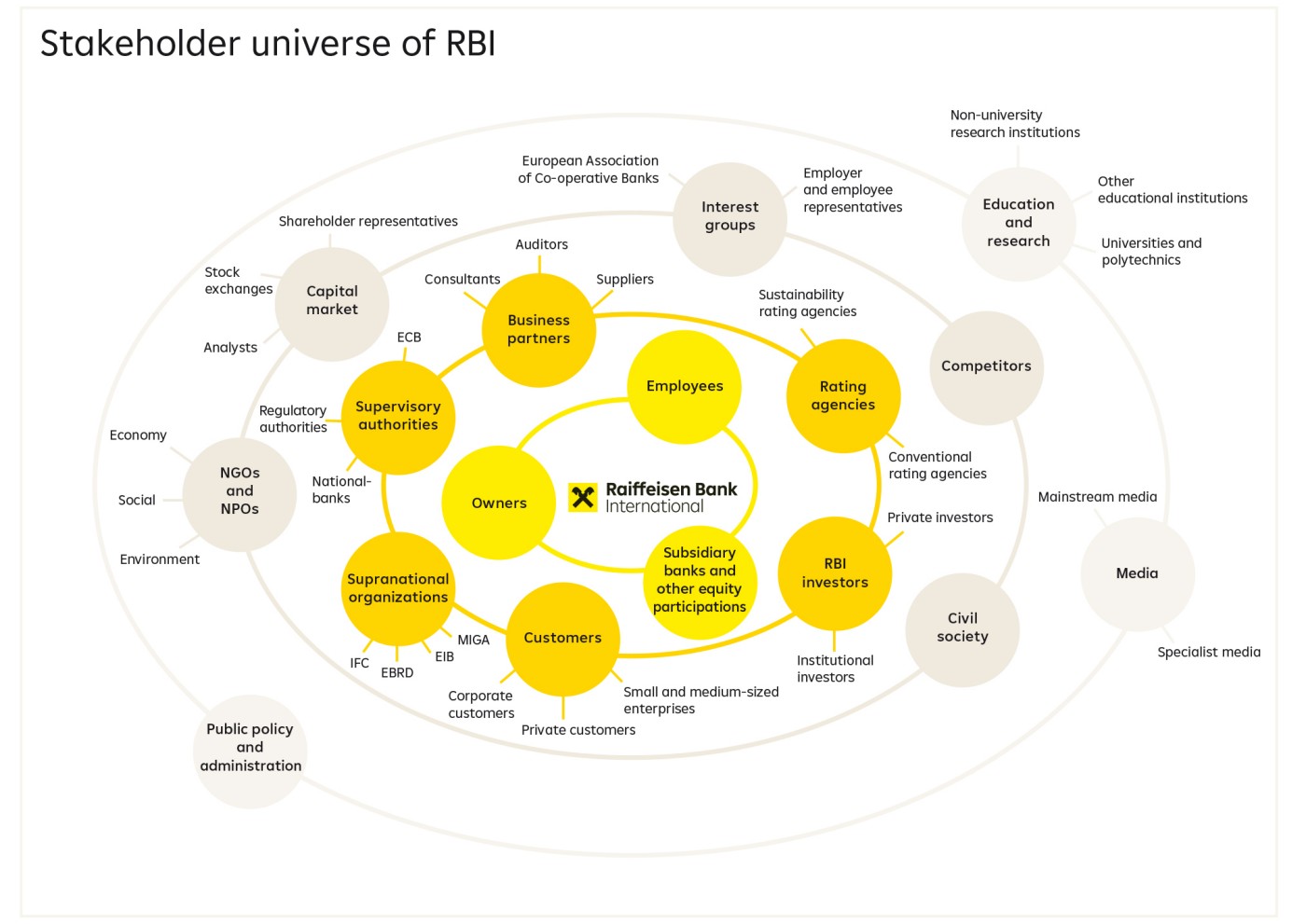
Stakeholder engagement
Stakeholders are those people or groups of people that have a justified interest in the company through their direct or indirect business activities. Stakeholders are therefore employees, customers, owners, subsidiaries and participations, suppliers and business partners. There are also several other stakeholder groups with regular mutual relations.
Stakeholder universe of RBI

Stakeholder engagement | Raiffeisen Bank International AG
We process the results and controversial topics from stakeholder dialogues in our sustainability committees and derive corresponding concrete objectives and measures for further development of our sustainability management. The identification of relevant and sensitive issues takes place through regular effective dialogue with stakeholders.
Material topics
The impact of the individual sub-topics was evaluated on a case-by-case basis, using the likelihood of occurrence and the level of severity to assess their significance. The most important tool for our core business is the UNEP FI Impact Analysis Tool, used to identify the most positive and negative impact areas.
For Inhouse ecology, the main environmental impact factor was identified as consumption related greenhouse gas emissions. For the other sub-topics, we used qualitative descriptions combined with an assessment of each to determine the degree of impact and subsequently identify materiality.
Stakeholder council
Numerous stakeholder councils served the purpose of exchange and knowledge transfer in the past.
More than 80 persons from the various stakeholder groups participated in the tenth RBI Stakeholder Council. The participants were welcomed by CEO Johann Strobl, who reported on how the changed environment had led to an intensive discussion of the bank's positioning.
Stefanie Mills, Head of Group Strategy Development, then informed about the result, "Vision 2025". This was followed by Andrea Sihn-Weber, Head of Group Sustainability Management, with her presentation on current developments in Sustainability Management. Before the stakeholders dealt with RBI's mission in various working groups, Christian Helmenstein, Member of the Board of the Economica Institute, dealt with a current analysis of RBI's economic significance.
At the end of November, more than 90 people from different stakeholder groups took part in the RBI's annual Stakeholder Council and discussed how digitisation can help the RBI to operate in a more sustainable manner in the future. Keynote speaker René Schmidpeter, Professor of International Business Ethics and CSR at Cologne Business School, highlighted the need for an inclusive approach to sustainability.
This time specifically, in the question of how digitisation can help the RBI to operate in an even more sustainable way in the future. He also stressed that the annual stakeholder council was an important and established dialogue format and highlighted the central role of societal expectations of the company.
The eighth RBI Stakeholder Council, held in mid-November at the Sky Conference, was attended by more than 80 people from various stakeholder groups – customers and business partners, employees and owners, the financial community and sustainability rating agencies, education and research, interest groups, the media, politics and administration, NGOs and NPOs. The aim was to shed light on RBI's possible contribution to the global Sustainable Development Goals (SDGs) adopted by the international community in autumn 2015. The event was therefore held under the motto "SDGs meet RBI".
Andrea Sihn-Weber, Head of RBI Group Sustainability Management, presented current developments in sustainability management and suggestions from former stakeholder dialogues that have already been implemented. With regard to RBI's comprehensive sustainability reporting, she reported that it documents which activities were implemented in the past year. This year's award at the annual Austrian Sustainability Reporting Award (ASRA), where RBI's Sustainability Report was awarded third-best sustainability report by large companies in Austria, showed that the performance is right. Various sustainability ratings and the renewed inclusion of RBI in the VÖNIX sustainability index on the Vienna Stock Exchange as well as a new Carbon Disclosure Project award due to the high quality of the measures to reduce CO2 emissions throughout the group were also cited.
Keynote Speaker Nebojsa Nakicenovic, Deputy Chairman of the Board of Management of the International Institute for Applied Systems Analysis (IIASA), professor in retirement for power industry at the Vienna University of Technology and author of numerous scientific publications, highlighted the "great transformation towards sustainability for all" in his presentation. He sees the implementation of the global SDGs as a social contract with the world. From his point of view, there is no plan B, because there is no planet B either. The implementation of SDGs will only be possible if the financial sector also participates in the transformation. In the last 200 years, major changes have already taken place in the areas of mobility, production and services. He is therefore convinced that the economy can be transformed into a "low-carbon economy" by 2050.